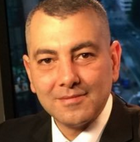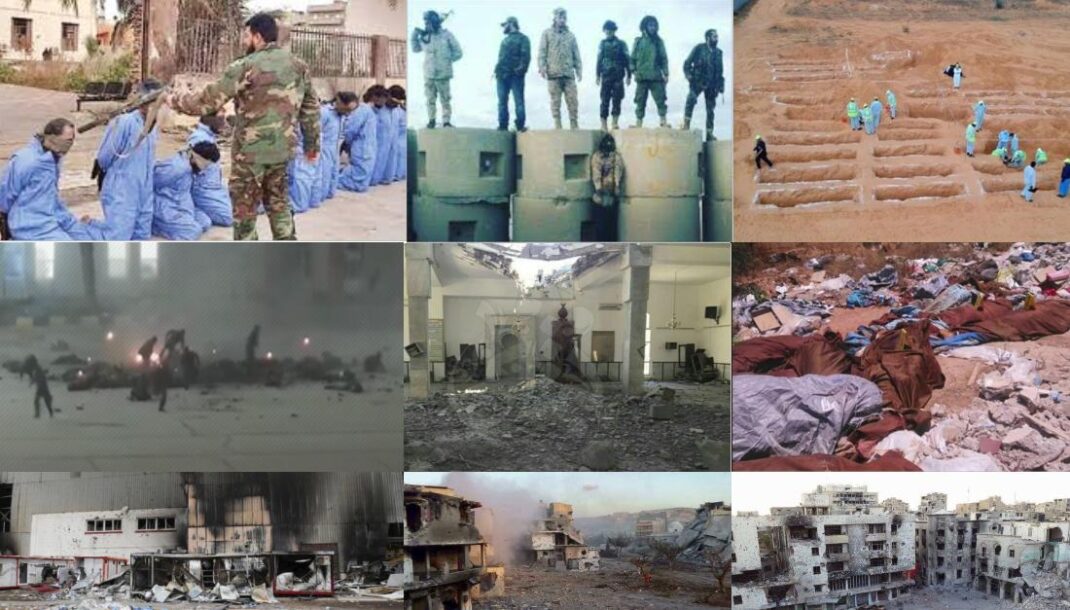The Criminal Role of Saudi Arabia and UAE
Mahmoud Refaat
 War crimes and crimes against humanity have been perpetrated by the belligerents in Libya and continue to make victims. It is necessary to conduct thorough investigations into the actions of Haftar and his seconds, who participated in massacres of civilians, such as in Tarhunah. These individuals must be prosecuted and convicted.
War crimes and crimes against humanity have been perpetrated by the belligerents in Libya and continue to make victims. It is necessary to conduct thorough investigations into the actions of Haftar and his seconds, who participated in massacres of civilians, such as in Tarhunah. These individuals must be prosecuted and convicted.
PART (III)
1.11 Death in Custody
Amnesty International has received numerous reports of the deaths of humanitarian, former, human rights organizations, journalists and current detainees in detention facilities in official and informal places of detention.
Amnesty International is aware that it has not yet conducted an independent investigation into the causes and circumstances of the deaths in these detentions.
Between 2017 and 2020, seven refugees and immigrants detained at the DCIM detention centre told Amnesty International that they witnessed the death of detained friends, family members or other detainees.
Several other refugees and immigrants learned of the deaths of several relatives at the DCIM detention centre, including a man who lost an eight-month-old baby in 2018.
Amnesty International recently learned of the death of an immigrant from a DCIM detention centre in July 2020, apparently due to malnutrition and lack of medical services. Witnesses pointed out that gun violence, torture, starvation, lack of medical services and generally poor detention conditions.
For example, “Abdi”, who lived in Libya from November 2017 to January 2019 after escaping from Somalia, told Amnesty International about his experience at the DCIM detention centre in April 2018 in Sikka. He stated that he saw about 600 people there.
Amnesty International has received numerous reports of the deaths of humanitarian, former, human rights organizations, journalists and current detainees in detention facilities in official and informal places of detention.
Amnesty International is aware that it has not yet conducted an independent investigation into the causes and circumstances of the deaths in these detentions.
Between 2017 and 2020, seven refugees and immigrants detained at the DCIM detention centre told Amnesty International that they witnessed the death of detained friends, family members or other detainees.
Several other refugees and immigrants learned of the deaths of several relatives at the DCIM detention centre, including a man who lost an eight-month-old baby in 2018.
Amnesty International recently learned of the death of an immigrant from a DCIM detention centre in July 2020, apparently due to malnutrition and lack of medical services.
Witnesses pointed out that gun violence, torture, starvation, lack of medical services and generally poor detention conditions.
For example, “Abdi”, who lived in Libya from November 2017 to January 2019 after escaping from Somalia, told Amnesty International about his experience at the DCIM detention centre in April 2018 in Sikka. He stated that he saw about 600 people there.
There are many things in tithe air is so bad that it makes people feel uncomfortable. Health and nutrition problems have been encountered. Amnesty International has documented an incident in which the security forces used illegal lethality in the city of Combs against refugees and migrants who did not pose a threat to the security forces or the lives and safety of anyone else.
Two people with knowledge of the landing of Al Khums told Amnesty International that on July 27, 2020, security forces opened fire on 72 refugees and migrants who landed. 150 survivors were taken to the DCIM detention center in Souq al-Khamis.
According to the International Organization for Migration, when the school dropouts tried to flee, “local authorities” opened fire on them, causing three deaths and two injuries.
The media quoted the department as saying: “The riot at the Al-Khums landing site resulted in the wrongful execution of three immigrants from South Sudan.”
He added that the lander attacked the base where LCG staff and their families were located, “anti-terrorism”. The troops” fired warning shots and “accidentally” killed three men. His claim was supported by the refuted “Declaration”.
The international humanitarian organization Médecins Sans Frontières (Doctors Without Borders) stated that refugees and migrants are actually trying to avoid arbitrary detention, noting that they are not armed. 150 International Organization for Migration custody at the DCIM150 Center.
For example, the IOM reported in March 2020 that a young man died in a fire in So-el-Jabl, a DCIM detention facility in Jindan.
According to statistics from Amnesty International and Human Rights, 152 refugees and immigrants were killed in the “camp” due to poor condition or violence.
1.12 Forced Labour
Immigrants and survivors of slavery in Libya are tense about their future due to the halt of rescue operations, aid and resettlement because of the ongoing coronavirus pandemic.
The United Nations Refugee Agency (UNHCR) announced 6 last week that it will cease certain activities in Libya, including visits to detention centers and the opening of registration centers set up to register new immigrants.
At the same time, both UNHCR and the International Organization for Migration (IOM) have suspended flights to resettle refugees and migrants.
As with humanitarian aid in the Mediterranean, refugees and migrants are deeply concerned that Libya’s harsh conditions, including forced labour and abuse, may worsen due to work stoppages.
In addition to aid, many people worry that COVID-19 may spread in overcrowded refugee communities.
Even if there are no conclusive cases, humanitarian workers and activists are worried that this pandemic may further stigmatize refugees and immigrants, among which respiratory diseases are common.
Immigrants are deeply concerned that cessation of work may exacerbate harsh conditions in Libya, including forced labour and abuse.
In addition to the possibility of not getting any help, many people are also concerned that COVID-19 may spread in a sparsely populated refugee community that has no chance to fight the disease.
Even if there are no confirmed cases of the disease, humanitarian workers and activists are worried about a pandemic.
This North African country has been in various wars for nearly a decade. Due to its fragile state, it is one of the main destinations for immigrants and refugees who wish to enter Europe from its coast.
Due to low government participation and lack of social order, the exploitation of these desperate people is widespread.
Forced labour by refugees and immigrants is widespread: they are forced to carry heavy objects, build shelters for military personnel, and in order to oppose forced labour, some even call themselves slaves.
Many reports of exploitation come directly from it. With generous funding from the European Union, the Libyan Coast Guard will return migrants detained in the Mediterranean to prison.
At the same time, after militia leaders reportedly used it as a base, they had to withdraw from the refugee center established by UNHCR in Tripoli earlier this year to replace the detention center.
The Free Federation is currently working to end slavery in Libya and pressure the European Union to end its funding policy for the Libyan Coast Guard, to ensure that prisons are closed and the current cycle of exploitation is broken.
In the face of the coronavirus pandemic, Libyan refugees and migrants have become more vulnerable, and they need your help more than ever.
1.13 Illegal Arms Transfer
The UAE has participated in a large number of arms transfers from the rebels to Libya, which violated the UN arms embargo imposed by the UN Security Council Resolution 1973.
According to a detailed report in the New York Times in 2012, the United Arab Emirates turned to the Obama administration for the first time in the first few months of the uprising in Libya to facilitate the delivery of American-made weapons.
The government rejected this request, but asked the UAE to send weapons to Libya that could not be traced back to the United States. Over the years, the United Nations PoE, which oversees embargoes, has recorded many cases of arms transfers from the UAE.
Some examples show violations not only by unscrupulous weapons dealers but also by member states.
In September 2011, the excess from Tirana The inventory of Abu Dhabi shipped 800,000 pieces of Chinese-made heavy machine gun ammunition to Benghazi, Albania. It was completed by the Armenian agent and the Ukrainian state-owned company UKRINMASH on behalf of the UAE Armed Forces.
Abu Dhabi International Airport had obtained a flight permit but changed the flight route. The subsequent three flights violated Emba’s arms supply and transported the cargo to Benghazi. The transportation “is part of a larger agreement between UKRINMASH and the coalition government.
The number of United Arab Emirates (through Armenian agents), including 2 million 12″.”7 x 108mm rifles and 1,000 AK-47 assault rifles,” the general practitioner said. Experts pointed out that despite the arms embargo, all three flights were given conflict-free NATO numbers with the approval of the UAE military.
This translation was repeated, but no response was received. This case clearly shows how the UAE has played a key role in providing appropriate weapons and ammunition to the Libyan rebels despite the arms embargo, with or without the tacit approval of NATO allies.
One of the many violations of the Libyan arms embargo is the further decline in the credibility and effectiveness of the international arms embargo. Since 2012, STREIT is a Russian-Canadian company whose production bases are mostly located in the United Arab Emirates.
With the approval of various administrative agencies, it has exported hundreds of armoured vehicles (Cougar, Spartan and Cobra) to the Libyan Ministry of Interior. Office in the UAE.
The United Arab Emirates includes goods and materials submitted to the Import and Export Control Executive Directorate.
“Although STREIT rejects any suggestion,” the suggestion was hurt intentionally or in other ways national or international law“, which means he did not realize the embargo, which is an unlikely and pathetic excuse for large international defence companies.
At the same time, Canadian authorities are investigating the sale of STREIT to Libya and Sudan due to the UN embargo.
He also recorded the transfer of UAE military equipment to the Zintana Sawaik brigade in southwest Tripoli in 2013, including UAE NIMR armoured personnel carriers and AR assault rifles. -M9F Bulgarian descent and uniform.
The report mentioned one the case of a Mi-24p attack helicopter, which was delivered to LNA Haftar in eastern Libya in April 2015.
Belarus confirmed to the team that the Mi-24p helicopter with this marking had been handed over to the United Arab Emirates.
In 2014, Part of the 4 Mi-24p delivered, Belarus issued an end-user certificate and registered the transfer in the United Nations Register of Conventional Arms in 2015.
The transfer of this helicopter and Belarus has received an application from the United States to the United Arab Emirates permission to allow the helicopter to be re-exported to Libya, but no response has been received.
“In 2015, “Defense News” reported that negotiations between the commander of the Libyan National Army, General Haftar and Arab leaders are guiding the Libyan army to purchase weapons, including helicopters delivered by Emirates in April 2015.
The source said: “Finally, a month ago, a large amount of Russian equipment, including anti-tank, armoured weapons and ammunition, had been delivered to five upgraded Mi-35 Hind helicopters.” Since 2016, several aircraft have flown into the distance shift.
Harding Airport, 100 kilometres west of Canada, is under active development.
In October 2016, Jane’s Defense Weekly published a list of UAE aircraft, which included six AT-802 light attack aircraft, two UH-60 Black Hawk helicopters and two Wing Lung drones.
As the transport aircraft of the Il-76, Jane said that the aircraft combination “is the same as the aircraft combination.
1.14 Libya Untenable & Dire Situation of Children
The chaos and violence caused by the prolonged civil war have severely harmed Libyan children, including immigrants and refugees.
Although fighting resumed in the capital Tripoli and the western suburbs of Libya in April last year, the living conditions of thousands of children and civilians have deteriorated, and indiscriminate killings in densely populated areas have claimed hundreds of lives.
According to Ms. Fall, these children were mutilated, killed and involved in fighting. Chairman) In 2011, Libya faced economic collapse and turmoil despite its large oil reserves.
Fighting between the arrogant factions of the Libyan National Army resulted in thousands of deaths. An important international summit will be held in the German capital next Sunday.
The UN Prime Minister admitted that the government and Haftar Commander will attend the meeting to seek a permanent ceasefire. More than 150,000 people have been evicted from their homes, 90,000 of whom
are children and have now been displaced. He pointed out that the “infrastructure on which children depend” is being threatened. He said: “About 30 medical facilities were damaged during the conflict, and 13 of them have been closed.”
He added that attacks on schools and threats of violence caused schools to close and about 200,000 children were unable to attend classes. They were attacked and the waste management system collapsed, greatly increasing the risk of water-borne diseases, including cholera.
The 60,000 refugee and immigrant children currently living in urban areas are also at high risk, especially the 15,000 unaccompanied children and children in detention centers.
These children are already struggling with protection and basic services, because the escalation of conflict will only increase the risks they face.
“UNICEF and its local partners provide children and their families with health care, nutrition, protection and education, as well as water and health support .… Before the Berlin Peace Summit this Sunday, fall urged scammers to call all parties. Those who have influence on this “urgently seek a comprehensive and lasting peace agreement for the benefit of all children in Libya” .
***
Mahmoud Refaat is an expert in international law, politician and writer. Refaat is the president of the European Institute for International Law and International Relations in Brussels, Belgium.
______________





